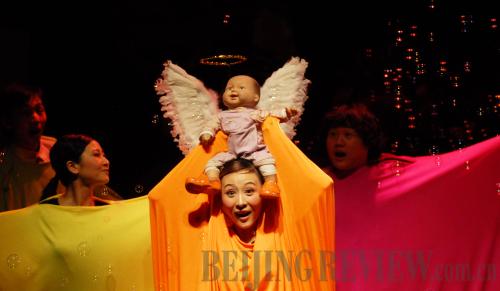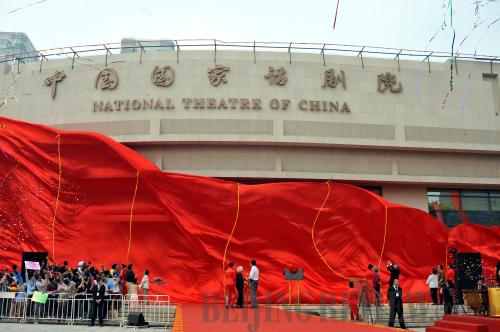|
 |
|
PROFITABLE: A Love Rhapsody, SanTuoQi Theater's most profitable play so far (WEI YAO) |
Near the new location of CCTV in Beijing there is a theater called Nine Theater, which leaves the chaos of TV far behind and is permeated with the warmth of a family. On May 30, it ushered in a two-month festival of theater, organized by Zhao Miao's Theater SanTuoQi.
Zhao founded SanTuoQi in December 1996 when he was still a middle school student, harboring the hope of creating a flourishing Chinese modern theater. The seven plays to be staged during the SanTuoQi festival represent the theater's repertoire over the past 15 years.
"In the first decade, each participant had to put in 100 yuan ($15.4) to perform in a play, and we called it a tuition fee," said Zhao.
Zhao is not the only one who has to pay for his fascination with theater. Back in 1999 when Meng Jinghui, one of the founders of China's contemporary theater industry, directed the play Rhinoceros in Love, he put up his own house to cover the costs of the play. His efforts paid off when this masterpiece received a warm welcome and enjoyed great success on its debut to become the first profit-earning play in 1999.
Nevertheless, the new generation of theater, represented by Zhao, is facing a much more complicated situation than in Meng's time. There is a constant battle between artistic ideals and commercial operation, often ending up in compromise.
Early in 2003, inspired by the physical theater in Europe and America, Zhao directed the silent play 6:3. The market, however, didn't remain silent about Zhao's bold experiment which, instead, received pure criticism.
SanTuoQi didn't gain its first financial input until 2007 when it received 200,000 yuan ($30,300) from an investor, though he didn't believe the theater could make any money.
To prove the investment was worth making, Zhao decided to stage quality plays that could be commercially successful and also cater to his own ideals. Before long, he created A Love Rhapsody, which earned 300,000 yuan ($45,000) in the first round of performances. It is still the most profitable of SanTuoQi Theater's repertoire.
 |
|
NEW HOME: The new location of the National Theater of China is unveiled on May 18 (XINHUA) |
Great changes have taken place in the Nine Theater, where SanTuoQi's masterpiece A Love Rhapsody is now on show. In 2003, when the theater was first founded, its takings didn't cover its costs and everyone in the theater was obliged to sell tickets. But in 2009, it gave nearly 1,000 performances, with its box office hitting 10 million yuan ($1.5 million).
Theater has been in China for over 100 years and there are circumstances where playwrights are confused or doubtful. The mainstream of the Chinese theater industry used to be plays invested and funded by the government. Now, the government has backed off as a direct promoter of the industry, and many companies, believing the theater market is a promising one, are willing to invest in it.
"More theaters are now sponsored by companies," said Fu Ruoyan, Director of the Zheteng Cultural Communication Co. Ltd., which has produced many plays, including SanTuoQi's masterpiece A Love Rhapsody. "Producers of plays now have more channels for funding and making money. Compared with last year, greater numbers of institutional investors are showing up in this industry, and their professional experience in investment is bound to boom the market."
|
